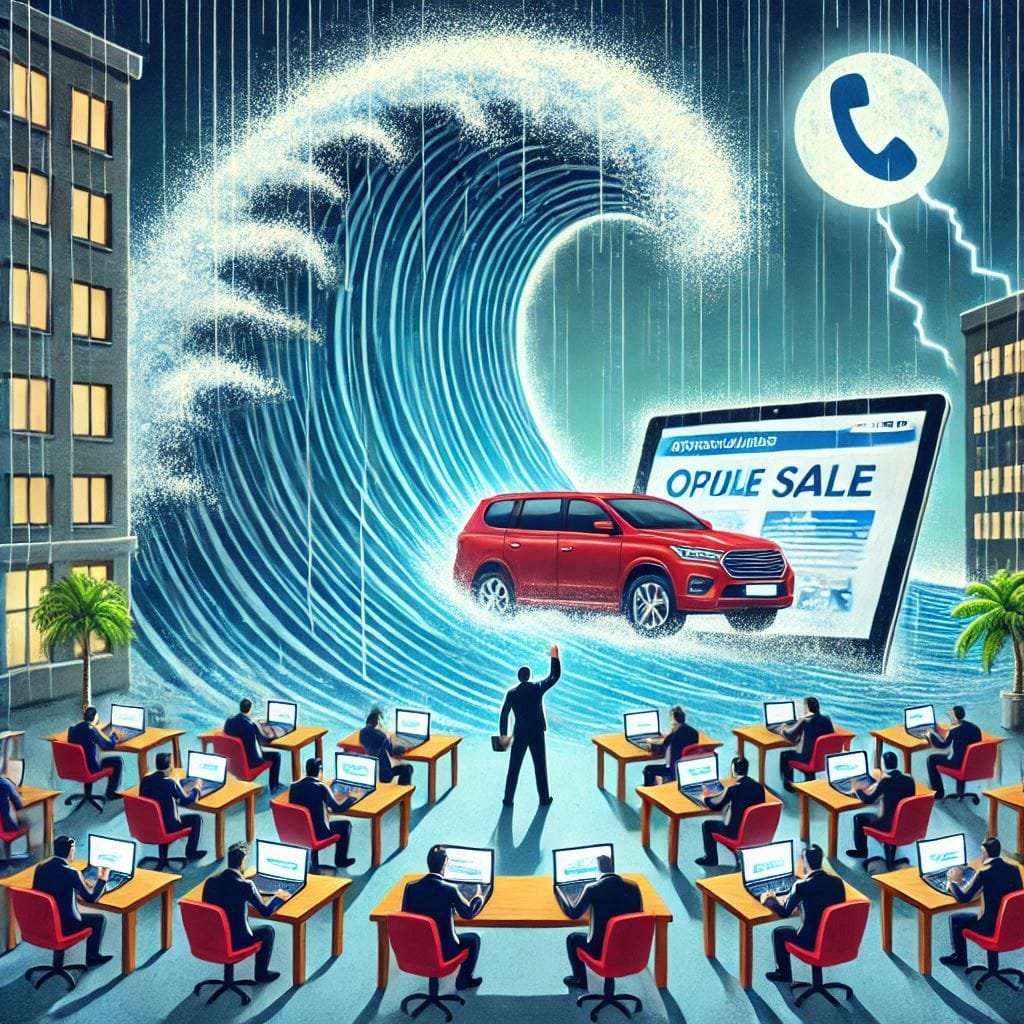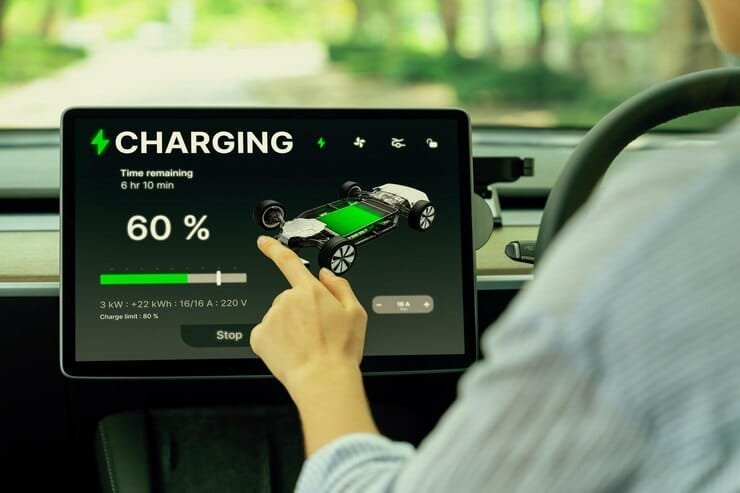Is Your Dealership Obsolete? The Online Car Sales Tsunami.
The automotive world is undergoing a seismic shift. Remember those leisurely Saturday afternoons spent browsing dealership lots? That’s becoming a relic of the past. Online car sales aren’t just a trend anymore; they’re a tidal wave reshaping the entire industry. Forget dusty showrooms; the future of car buying is digital, immediate, and intensely competitive.
This blog post isn’t about doom and gloom; it’s about embracing the change and thriving in the new landscape. We’re diving headfirst into the online car sales tsunami, offering strategies to not only survive, but conquer.
Here’s what we’ll cover:
- The Changing Consumer: Today’s car buyer is digitally savvy, researching extensively online before ever setting foot (or clicking a mouse, perhaps!) in a dealership. They expect transparency, convenience, and personalized experiences – all delivered digitally. Failing to cater to this expectation means losing potential sales.
- The Rise of Online Platforms: From dedicated car marketplaces to manufacturer websites and even social media, the avenues for online car sales are exploding. Understanding these platforms and their nuances is vital for effective marketing and sales strategies. Ignoring them leaves you adrift in a sea of competitors.
- The Technology Gap: Many dealerships are still operating on outdated systems. This isn’t about fancy gadgets; it’s about robust, user-friendly online tools, from inventory management and CRM systems to secure payment gateways and virtual appointment scheduling.
- Redefining the Customer Journey: The traditional sales funnel is obsolete. Online car sales demand a fluid, customer-centric approach that seamlessly integrates online and offline experiences. We’ll discuss building a digital funnel that works for your customers.
- The Bottom Line: The shift to online car sales isn’t just about adapting; it’s about unlocking significant growth opportunities. By embracing digital transformation, dealerships can reach a wider audience, improve efficiency, and significantly boost profitability. This isn’t just about surviving—it’s about thriving in the new automotive age.
## Online Car Sales Market: Trends & Actionable Insights
The online car sales market is booming, but it’s a dynamic landscape. Here’s a breakdown of key trends, categorized for easy digestion:

I. Positive Trends:
- Rise of Online-Only Dealerships: Pure-play online retailers like Carvana and Vroom are disrupting traditional dealerships by offering streamlined, transparent processes and home delivery. This trend is fueled by consumer preference for convenience and a desire to avoid the haggling associated with brick-and-mortar dealerships. Actionable Insight: Invest in seamless online experiences, including high-quality photography, virtual tours, and easy financing options. Explore direct-to-consumer models and leverage technology for efficient logistics.
- Data-Driven Personalization: Advanced analytics allow companies to personalize the car buying journey. AI-powered recommendation engines suggest suitable vehicles based on individual needs and preferences. This leads to increased conversion rates and customer satisfaction. Actionable Insight: Invest in robust data analytics and AI capabilities to understand customer behavior and personalize marketing and sales interactions.
- Growing Acceptance of Subscription Models: Car subscription services (e.g., Porsche Passport, Volvo Care by Volvo) offer flexibility and convenience, appealing to younger generations less interested in long-term ownership. Actionable Insight: Explore subscription models as a supplementary revenue stream, catering to evolving consumer preferences.
II. Adverse Trends:
- Supply Chain Disruptions: Global chip shortages and logistical challenges continue to impact inventory levels, causing price volatility and affecting delivery times. Actionable Insight: Diversify sourcing, build stronger relationships with suppliers, and proactively communicate potential delays to customers to manage expectations. Explore alternative vehicle sourcing strategies.
- Increased Competition: The market attracts both established players and new entrants, leading to intense competition on price and services. Actionable Insight: Focus on differentiation through superior customer service, unique value propositions (e.g., guaranteed buyback programs), and strategic partnerships.
- Cybersecurity Threats: The digital nature of online car sales exposes businesses to cybersecurity risks, including data breaches and fraud. Actionable Insight: Invest heavily in robust cybersecurity measures, including encryption, multi-factor authentication, and regular security audits. Compliance with data privacy regulations is crucial.
- Consumer Trust & Transparency: Building trust is paramount. Consumers need assurance regarding vehicle history, condition, and pricing transparency. Actionable Insight: Implement robust quality control measures, offer detailed vehicle inspection reports, and provide transparent pricing with minimal hidden fees. Positive customer reviews and testimonials build trust.
III. Emerging Trends:
- Integration of AR/VR: Augmented and virtual reality technologies are enhancing the online car buying experience, allowing customers to virtually explore vehicles and customize options. Actionable Insight: Invest in AR/VR technology to create immersive experiences, bridging the gap between online and offline interactions.
- Blockchain Technology for Transparency: Blockchain can improve transparency in vehicle history and ownership verification, reducing fraud and building trust. Actionable Insight: Explore the potential of blockchain technology to enhance trust and security within the online car sales ecosystem.
By proactively addressing these trends, online car sales businesses can navigate the evolving market and achieve sustainable growth. Remember, customer experience remains the key differentiator in this increasingly competitive landscape.
1. Automotives: Car manufacturers like Tesla pioneered direct-to-consumer online sales, bypassing traditional dealerships. This allows for better control over pricing and customer experience, gathering valuable data on consumer preferences directly. The key takeaway is the potential for increased profit margins and streamlined operations by cutting out the intermediary.
- Automotives (Used Car Market): Companies like Carvana and Vroom utilize online platforms for buying and selling used vehicles, offering a transparent and convenient process, including home delivery. This demonstrates the power of technology in disrupting established models and appealing to a time-conscious customer base. The lesson: Invest in digital platforms and logistics to compete effectively.
- Financial Services: Banks and financing companies are integrating online car sales into their offerings. They offer pre-approved loans and financing options directly on car sales websites, making the purchase process smoother for customers. This illustrates the synergistic potential of collaboration between related industries to improve the customer journey. The insight: Partnerships with financial institutions can significantly boost sales.
- Technology: Tech companies provide the software and platforms that power online car sales. This includes inventory management systems, customer relationship management (CRM) tools, and secure payment gateways. The takeaway here is that investing in robust technology is crucial for scalability and maintaining a competitive edge.
- Insurance: Insurance companies are leveraging online car sales data to provide customized insurance quotes and policies based on vehicle information and buyer profiles. This highlights the importance of data-driven decision-making and the potential for tailored insurance offerings to boost sales conversion rates. The key takeaway: Leveraging data for cross-selling opportunities in connected industries.
- Logistics: Third-party logistics providers play a critical role in delivering vehicles purchased online, offering services like transportation, vehicle inspection, and delivery scheduling. This illustrates the need for robust logistics capabilities to support a seamless online sales experience. The insight is that efficient logistics are essential for customer satisfaction and business success in online car sales.
- Marketing & Advertising: Digital marketing agencies specialize in generating leads and driving traffic to online car sales platforms, utilizing targeted advertising campaigns across various online channels. The learning point is the importance of a strong digital marketing strategy in reaching potential customers efficiently.
1. Leveraging AI-Powered Personalization: Since 2023, many online car sales platforms have heavily invested in AI to personalize the customer journey. This involves using AI to recommend specific vehicles based on browsing history, location, and budget. For example, Carvana has refined its AI recommendation engine to offer more granular suggestions, anticipating customer needs even before explicit searches are performed.
- Expansion into Subscription Models: Offering car subscriptions alongside traditional buying options is gaining traction. This caters to a segment of consumers seeking flexibility rather than long-term ownership. Companies like Fair and Autonomy are expanding their geographic reach and vehicle options, capitalizing on the increasing popularity of this alternative model.
- Enhanced Virtual Reality (VR) and Augmented Reality (AR) Experiences: To bridge the gap between online browsing and physical inspection, platforms are improving virtual showroom experiences. VR allows customers to explore vehicles in 360 degrees from the comfort of their homes. AR tools, integrated into smartphone apps, can overlay vehicle information onto a real-world view of a parked car.
- Strategic Partnerships with Fintech Companies: Collaborations with financial institutions are crucial for streamlining the financing process. This includes integrated loan applications, pre-approvals, and even personalized financing options directly within the platform. Companies are choosing partners offering quick and user-friendly digital loan processing, reducing friction for buyers.
- Investing in Data Analytics for Targeted Marketing: Precise data analytics informs targeted marketing campaigns. This allows companies to effectively reach specific customer segments through personalized ads and content on social media and other channels. Vroom, for instance, utilizes sophisticated analytics to optimize ad spending and conversion rates, focusing on high-intent customers.
- Acquisitions to Expand Inventory and Geographic Reach: Inorganic growth strategies are also prominent. Companies are acquiring smaller dealerships or online platforms to quickly expand their inventory and reach new markets. Several large players have been aggressively pursuing acquisitions to increase market share and gain access to new customer bases.
- Focus on Omnichannel Integration: Seamless transitions between online and offline experiences are critical. Customers should be able to initiate a purchase online and complete the process in person, or vice-versa, without any hiccups. This requires robust systems that integrate online platforms with physical showrooms or delivery networks.
- Blockchain Technology for Enhanced Transparency and Security: Some platforms are experimenting with blockchain to enhance transparency in the car’s history report and secure transactions. This provides buyers with more trust and confidence in the provenance of the vehicles, building a greater sense of security in the online buying process.
-

Outlook & Summary: Riding the Online Car Sales Tsunami
The automotive retail landscape is undergoing a seismic shift, and the traditional dealership model is feeling the tremors. The next 5-10 years will see the online car sales tsunami fully crest, reshaping the industry in profound ways. This article explored the key challenges and opportunities presented by this dramatic change.
Here’s a glimpse into the near future:
- Increased Transparency and Price Competition: Expect even greater price transparency fueled by online marketplaces and data-driven pricing tools. This will force dealerships to sharpen their pencils and offer more competitive deals, squeezing profit margins for those unwilling to adapt. Think “Amazon-ification” of car buying – a constant pressure to offer the best price.
- The Rise of the Digital Showroom: Dealerships that survive will evolve into digital showrooms, blending online and offline experiences seamlessly. This means robust online inventory management, virtual tours, and personalized online consultations, ultimately leading to a more efficient customer journey.
- Subscription Services and Flexible Ownership: We’ll see a growth in car subscription services and other flexible ownership models, challenging traditional financing structures. This caters to a younger generation less interested in long-term commitments.
- Data-Driven Decision Making: Success will hinge on leveraging data analytics to understand customer behavior, optimize pricing strategies, and personalize marketing efforts. Dealerships must become adept at using data to anticipate and meet evolving consumer needs.
- Tech Integration Is Key: The integration of artificial intelligence, virtual reality, and other advanced technologies will be crucial for providing a superior customer experience and streamlining operations.
Key Takeaway: The online car sales revolution is not a wave; it’s a tsunami. Ignoring it means being swept away. Adaptation and innovation are no longer optional; they’re essential for survival and success in the evolving automotive retail sector.
The Big Question: Are you ready to navigate the changing tides of the online car sales revolution, or will your dealership be left behind on the shore?





